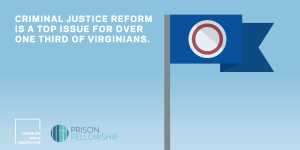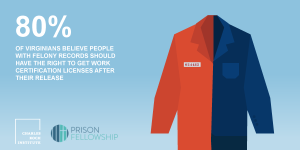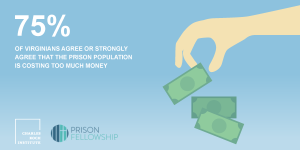Results show Virginians support policies that improve public safety, reduce costs, and respect the human dignity of all individuals.
Lansdowne, Va and Arlington, Va. – As Virginians consider what is next for criminal justice reform, Prison Fellowship and the Charles Koch Institute today released the results of a public opinion survey on criminal justice.
 “The people of Virginia clearly support commonsense reforms,” said Vikrant P. Reddy, Senior Research Fellow at the Charles Koch Institute. “Justice and the guarantee of safety are basic duties of government. We all deserve to live in safe neighborhoods and walk on safe streets. In Virginia, there are actions that can be taken in the short run to dramatically improve our current justice system. We can improve public safety, reduce costs, and respect each individual’s dignity.”
“The people of Virginia clearly support commonsense reforms,” said Vikrant P. Reddy, Senior Research Fellow at the Charles Koch Institute. “Justice and the guarantee of safety are basic duties of government. We all deserve to live in safe neighborhoods and walk on safe streets. In Virginia, there are actions that can be taken in the short run to dramatically improve our current justice system. We can improve public safety, reduce costs, and respect each individual’s dignity.”
The results of the survey show that criminal justice reform is a top issue for over one-third of Virginians. Thirty-six percent rate it as either their top issue or one of the top five issues most important to them.
Overall, Virginians recognize the flaws with the current system:
- 75% of Virginians agree or strongly agree that the prison population is costing too much money.
- 75% of Virginians agree or strongly agree that prisons ought to prioritize rehabilitation.
- 72% of Virginians agree or strongly agree that judges should have more freedom to use forms of punishment other than prison.
 When asked about the felony larceny threshold, Virginians would support changes to the current standards: (Note: The current felony larceny threshold is $200 in Virginia, the lowest in the country.)
When asked about the felony larceny threshold, Virginians would support changes to the current standards: (Note: The current felony larceny threshold is $200 in Virginia, the lowest in the country.)
- 65% of Virginians agree that larceny of $200 of goods from a retail store should be a misdemeanor offense; only 22% believe it should be a felony.
- 50% of Virginians agree that larceny of $500 of goods from a retail store should be a misdemeanor offense; only 34% believe it should be a felony.
Virginians believe that individuals with felony convictions should be able to work after they are released:
- 80% of Virginians believe people with felony records should have the right to get work certification licenses after their release.
Virginians strongly support the reinstatement of parole:
- By a 3 to 1 margin (64% to 21%), Virginians support reinstating a parole system.
- Conservative (self-described conservative or very conservative) Virginians support reinstating a parole system by a 2 to 1 margin (55% to 28%).
 “Across the nation, we have seen the states lead on issues of criminal justice reform. Virginia is now poised to join the ranks of other largely conservative states who have increased public safety, taken strides to save taxpayer money, and ultimately, have created a more restorative system of justice that upholds the dignity of all involved,” said Craig DeRoche, Senior Vice President, Advocacy & Public Policy, Prison Fellowship. “These polling results tell us that the Commonwealth has an appetite for a system of criminal justice that truly restores.”
“Across the nation, we have seen the states lead on issues of criminal justice reform. Virginia is now poised to join the ranks of other largely conservative states who have increased public safety, taken strides to save taxpayer money, and ultimately, have created a more restorative system of justice that upholds the dignity of all involved,” said Craig DeRoche, Senior Vice President, Advocacy & Public Policy, Prison Fellowship. “These polling results tell us that the Commonwealth has an appetite for a system of criminal justice that truly restores.”
The survey was conducted by Survey Sampling International in December 2015. All participants were residents of Virginia and were surveyed by use of an opt-in Web-based panel. The survey had 1,000 total respondents with a +/- 4 percentage points margin of error. The margin of error increases when looking at smaller sub-populations of the sample.
Full results of the poll can be found here.
For media inquiries, please contact:
Michelle Farmer (mfarmer@demoss.com / 770.813.0000) or Scott Knuteson (sknuteson@demoss.com / 770.813.0000)
Jesse Blumenthal (jesse@charleskochinstitute.org / 703.875.1728)
Prison Fellowship was founded in 1976 by Charles Colson, a former aide to President Nixon who served a seven-month sentence for Watergate-related crimes. Today the Christian nonprofit is the nation’s largest outreach to prisoners, former prisoners, and their families, and a leading advocate for criminal justice reform.
The Charles Koch Institute is an educational organization focused on the importance of free societies and how they increase well-being for the overwhelming majority of people. Through the Institute’s professional education, research, and training programs, we work to prepare professionals for careers that improve well-being by advancing free societies.